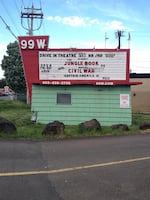
In August, the 99W Drive-In Theatre will be celebrating its 70th anniversary. Historians estimate that there were as many as 50 drive-ins in Oregon, but now only a handful remain.
courtesy of Brian Francis/99W Drive-In Theatre
In August, the 99W Drive-In Theater in Newberg will be celebrating its 70th anniversary. From “Beyond the Valley of the Dolls” to the more recent “Indiana Jones and the Dial of Destiny,” the theater has been delivering outdoor cinema to moviegoers since 1953.
Throughout Oregon’s history, the state has been home to nearly 50 drive-in theaters, but now just a handful remain.
Michael Aronson, the co-director of the Oregon Theater Project and an associate professor of cinema studies at the University of Oregon, says that a surge of drive-ins opened in Oregon when gas rationing ended after World War II.
“You see them popping up, a half-dozen or so every year,” he said. “By the early ‘50s there was an Oregon Drive-in Theater Association, that’s how strong it was.”
The heyday of drive-ins was the mid-1950s when there were upwards of 4,500 of these theaters across the country.
“The new hot thing was drive-in movie theaters,” said Brian Francis, owner of the 99W Drive-In Theater. “This technology was kind of put on hold during war years, for the drive-in it was unleashed.”
Before opening the drive-in, J.T. Francis, Brian’s grandfather, was already spreading his love of cinema by bringing a projector and sheet around rural parts of Oregon, playing at high schools, lodge halls and church basements. He eventually tired of the traveling movie business and built the 99W Drive-In in August 1953.
In the ‘30s and ‘40s movie theaters were located within cities, but that all changed with American car culture, Aronson said.
“As people began to leave the city centers and move out into places like Newberg in large numbers, drive-ins — because land was relatively inexpensive, because of car culture — really took off in this time,” Aronson said.
Drive-in theaters created communities and provided post-war pastimes for many. In the early days of drive-ins, ads played for free baby bottle warming and movie going was considered quality family entertainment. At the same time, horror films were taking the spotlight. It was an attractive genre for younger audiences.
“Drive-ins have always had that kind of duality: on one hand, family entertainment, on the other, really aimed at teenagers,” Aronson said.
Today, there are less than 300 drive-ins standing, and they face a number of challenges: from audience turnout to competing with smaller screens for viewers’ attention.
“It’s kind of gone back to the ‘90s in terms of attendance,” Francis said. “But what it really is, is streaming.”
On top of this, the land that many drive-ins occupy is now worth more than it was and is often more valuable for development. In fact, when 99W first opened, it was outside Newberg town boundaries; now it is well within it. Many smaller family operations like 99W have been able to survive over the years because they’ve been able to hold onto the land.
“As suburbs grow, you see as early as the 1970s in trade magazines that shopping malls take that same space up,” Aronson said. “They’re willing to pay much more, so there’s a real competition for land.”
In the industry, the summer marks the season for drive-ins when kids are out and more attendees are expected. Right now, Brian Francis is figuring out what’s best for the drive-in to attract the most viewers. He’s hopeful people enjoyed “The Flash” and “Indiana Jones,” but is still determining what’s next.
“This is the high season,” Francis said. “I know they want ‘Barbie’ or did I blow it by not running ‘Oppenheimer’?”
Brian Francis and Michael Aronson both joined OPB’s Think Out Loud to discuss the history of drive-ins in the state. You can listen to the full conversation here:
